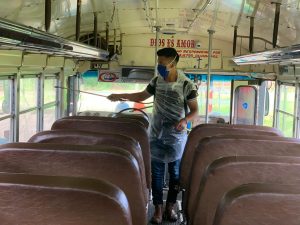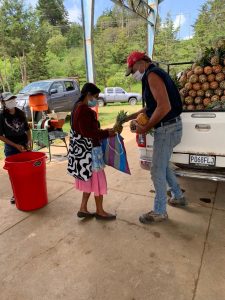Overcoming hurdles
By: Anneliese Haeussler on domingo, julio 5th, 2020 in Community, Events, Featured, Fundraising, Mission, More Ways to Give, Official, Planned Giving, Sponsored, Stories, Water
July 3, 2020. From the Wells of Hope Facebook post by Ted and Miriam van der Zalm. We began last week with reaching out to 350 of the poorest of the poor in the mountain communities of Santa María Jalapa by feeding them a hearty meal once a day. These were the neediest people, made up of single mothers and her children, the elderly and families with disabled caregivers who lived closest to the food kitchen that we set up in Laguna del Pito. The short distance (2K or less) allowed them to walk to the large kitchen infrastructure that we set up so that the foodless families arriving would be guaranteed a nutritious, warm meal. We were just getting our feet wet!
We knew that we were scratching the surface of bringing food relief to the most desperate affected by the Covid-19 crisis in the mountains of Santa María Jalapa. Last week we reached out for help from our Wells of Hope family of supporters and the response was mountain moving! The financial contributions opened the doors to allowing us to help many more families.
 The generosity of our donors solved the immediate challenge of having enough finances available to purchase food…. only to lead us to the next challenge. The logistics of reaching out further was incredibly daunting! The distances and mountainous terrain made it impossible to think that the needing people from further communities could walk to the food center. Duplicating the kitchen set up in other localities would be too costly and would invite another barrage of logistical challenges.
The generosity of our donors solved the immediate challenge of having enough finances available to purchase food…. only to lead us to the next challenge. The logistics of reaching out further was incredibly daunting! The distances and mountainous terrain made it impossible to think that the needing people from further communities could walk to the food center. Duplicating the kitchen set up in other localities would be too costly and would invite another barrage of logistical challenges.
 One of the measures instituted by the Guatemalan government, in order to help slow down the spread of the Corona virus, was to shut down all systems of public transportation such as buses and mini vans. The bus companies have not been in operation for the better part of two months. Trusting in the power of Love, I approached the owner of one of the larger busing firms in Jalapa that was previously making hourly runs from Jalapa to Guatemala City. His fleet of buses were now parked, collecting dust and the drivers temporarily out of a job. I explained to Alex (the owner) about our food kitchen initiative and the desire to reach out further to our needing sisters and brothers. Alex was very moved by our efforts and immediately donated the use of three of his buses. He would cover the wages of the drivers if we could provide the fuel. A done deal!
One of the measures instituted by the Guatemalan government, in order to help slow down the spread of the Corona virus, was to shut down all systems of public transportation such as buses and mini vans. The bus companies have not been in operation for the better part of two months. Trusting in the power of Love, I approached the owner of one of the larger busing firms in Jalapa that was previously making hourly runs from Jalapa to Guatemala City. His fleet of buses were now parked, collecting dust and the drivers temporarily out of a job. I explained to Alex (the owner) about our food kitchen initiative and the desire to reach out further to our needing sisters and brothers. Alex was very moved by our efforts and immediately donated the use of three of his buses. He would cover the wages of the drivers if we could provide the fuel. A done deal!
 Now that we had the buses to transport the needing families to our food kitchen, we had to find a solution to legally drive the buses while buses have been banned from circulating in Guatemala. Through the persistence of many phone calls, knocking on departmental government doors, explaining our dilemma repeatedly, we eventually acquired the written permission to circulate the buses if we adhere to strict Covid-19 distancing and sanitizing legislation.
Now that we had the buses to transport the needing families to our food kitchen, we had to find a solution to legally drive the buses while buses have been banned from circulating in Guatemala. Through the persistence of many phone calls, knocking on departmental government doors, explaining our dilemma repeatedly, we eventually acquired the written permission to circulate the buses if we adhere to strict Covid-19 distancing and sanitizing legislation.
The buses would carry a large sign in the front windshield marked “Nutrition Center.” The buses had to run at half capacity, one person per seat. We must take the temperature of each person boarding the bus to make sure that no passenger was running a fever. Hand sanitizer would be liberally applied to the hands of all entering the bus. No one would be allowed to board without a face mask and the buses were to be disinfected after each day of use. Start your engines! Another hurdle has been overcome!
 With a multitude of volunteers from the communities that we were serving, men and women with just slightly a little more means, eagerly volunteered as food prep, cooks, night watchmen, bus monitors, social distancing policing, etc. in order to help feed their own.
With a multitude of volunteers from the communities that we were serving, men and women with just slightly a little more means, eagerly volunteered as food prep, cooks, night watchmen, bus monitors, social distancing policing, etc. in order to help feed their own.
The final immediate challenge was to figure out how to reach out to the neediest that were living in areas where there were no roads to allow for busing and too far to walk to the tarmac. This dilemma reminded me of the prayer of St Francis. “Please Lord, help me to accept the things that I cannot change, the courage to change the things that I can, and the wisdom to know the difference.”
 We had to accept the fact that logistically, delivering warm meals to these areas was not practical but help, we must. Two teams were set up to deliver, using our 4x4s, dry rice and corn to the most rural areas. A week’s ration of food would be given to the communities’ chosen poorest, struggling families. We could not, in good conscience, leave more than a week’s ration of food as leaving a greater volume of food would set up the elderly to be robbed by the unscrupulous members of the community. Leaving a larger amount of food would also tempt families to sell a portion of the food in order to have some money to meet other immediate needs, legitimate or not. We were able to develop a schedule that would allow us to reach the outlying communities once a week. With all the logistics in place, due to the generous response of our donors, Wells of hope is now feeding 1,200 to 1,500 people each day, depending the day of the week! Thank You!!!!!
We had to accept the fact that logistically, delivering warm meals to these areas was not practical but help, we must. Two teams were set up to deliver, using our 4x4s, dry rice and corn to the most rural areas. A week’s ration of food would be given to the communities’ chosen poorest, struggling families. We could not, in good conscience, leave more than a week’s ration of food as leaving a greater volume of food would set up the elderly to be robbed by the unscrupulous members of the community. Leaving a larger amount of food would also tempt families to sell a portion of the food in order to have some money to meet other immediate needs, legitimate or not. We were able to develop a schedule that would allow us to reach the outlying communities once a week. With all the logistics in place, due to the generous response of our donors, Wells of hope is now feeding 1,200 to 1,500 people each day, depending the day of the week! Thank You!!!!!